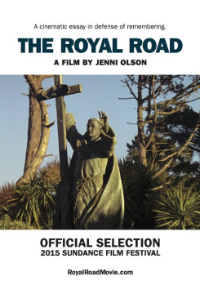 Jenni Olson begins The Royal Road, her latest emotional excavation of Hollywood nostalgia via Benning-esque 16mm landscape portraiture, by self-referentially quoting Michel Chion on the shadowy pretext of off screen voiceover after reflecting in her own dryly articulated voiceover on the monologue that opens Billy Wilder’s classic allegory of broken LA dreams, Sunset Boulevard. Though Olson’s film revolves around another stretch of California highway, the 600-mile El Camino Real strip, the cinematic reference leads us down a winding poetic path on which Hollywood history, the neglected record of the Mexican American War and Olson’s own unrequited romantic pursuits come together with the same sort of mannered meditation that won her San Francisco Film Critics Circle’s Marlon Riggs Award for The Joy of Life back in 2005.
Jenni Olson begins The Royal Road, her latest emotional excavation of Hollywood nostalgia via Benning-esque 16mm landscape portraiture, by self-referentially quoting Michel Chion on the shadowy pretext of off screen voiceover after reflecting in her own dryly articulated voiceover on the monologue that opens Billy Wilder’s classic allegory of broken LA dreams, Sunset Boulevard. Though Olson’s film revolves around another stretch of California highway, the 600-mile El Camino Real strip, the cinematic reference leads us down a winding poetic path on which Hollywood history, the neglected record of the Mexican American War and Olson’s own unrequited romantic pursuits come together with the same sort of mannered meditation that won her San Francisco Film Critics Circle’s Marlon Riggs Award for The Joy of Life back in 2005.
Pitting rigorously composed images of modern day Los Angeles and San Francisco against her own gender dysphoric voice, she explicates an emotional thoroughfare with historical reference points that sprawl across an edifying cultural map as wide as the vast diagram of colonial America she implicates midway through in order to clarify the dirty details of the conquest of California. Though the varying textural touchstones, ranging from quotes from General Ulysses S. Grant to playwright Tony Kushner and back through the halls of Hollywood to Hitchcock’s Vertigo, appear thematically disparate at first, yet Olson utilizes them as a means to reflect upon her own obsessions with landscape and longing.
She’s often imagined living in the skin of Hollywood actors as a means to face the realities of her homosexual identity, utilizing the confident visages of Jimmy Stewart or Fred MacMurray in her mind to commit to the pursuit of women perpetually unavailable. In meticulously observed voiceover she recounts her pursuance of two different women, amusingly making reference to the similarity of her romantic inquests to Scottie’s obsessive tailing of Madeline throughout the streets San Francisco. It’s an apt comparison, but no less tragic than the outcome of Vertigo.
Visually, her often ravishingly lensed landscapes appear at once mysterious and obvious. Unlike landscapers like James Benning who allow themes to develop out of the statically framed images he strings together, Olson seems to alternate between merely matching her locational images with the spoken topic at hand, whether it be former film shoot locales or historical monuments, and lyrically pairing picture with the emotional tone of the moment. Late in the film she expresses explicitly why she feels compelled to document the metropolitan landscapes of the cities she’s lived in over the years – it falls back on her tendency to be nostalgic. Though she takes Kushner’s sound advice that looking to the future is more productive than ruminating on the past, Olson can not help herself. In shooting landscapes, she documents them in time and space, creating a version of them that becomes portable and personal and wistfully reflective of a time that only moves further away. With heartbreaking candor and rigidly honed research that melds personal, cinematic and national history into one contemplative critique, The Royal Road attempts to memorialize these locales while unpacking the aberrant psychology of a filmmaker whose romantic pursuits are haunted by history before they even begin.
★★★/☆☆☆☆☆
Reviewed on January 23rd at the 2015 Sundance Film Festival – New Frontier Films Programme – 65 min


